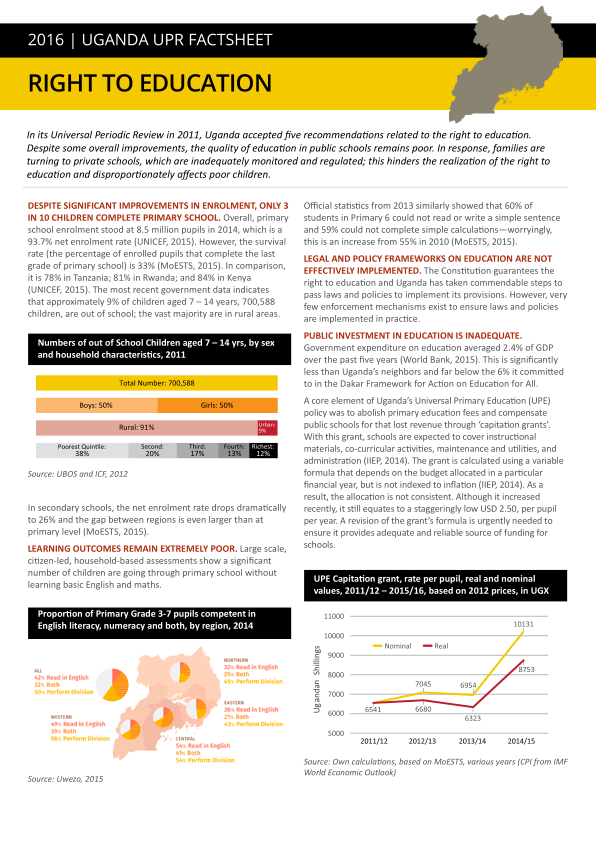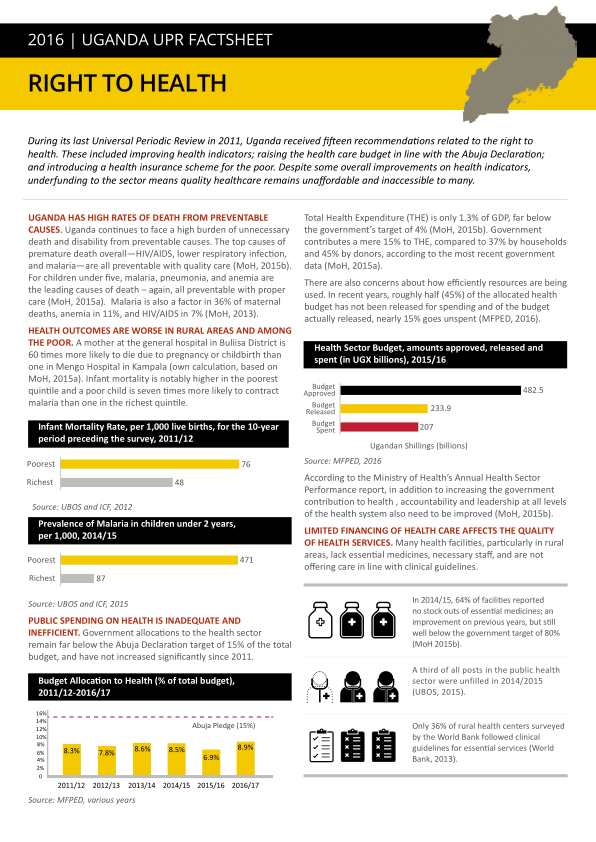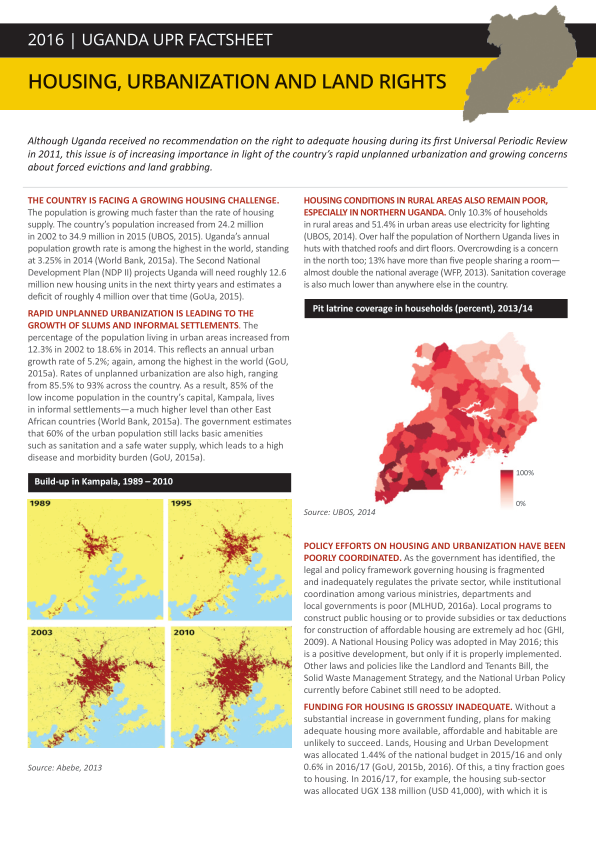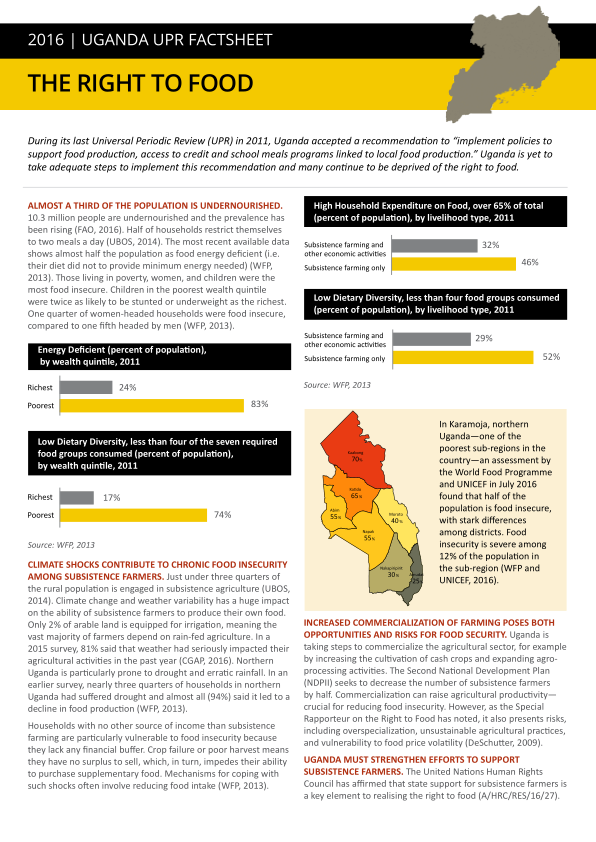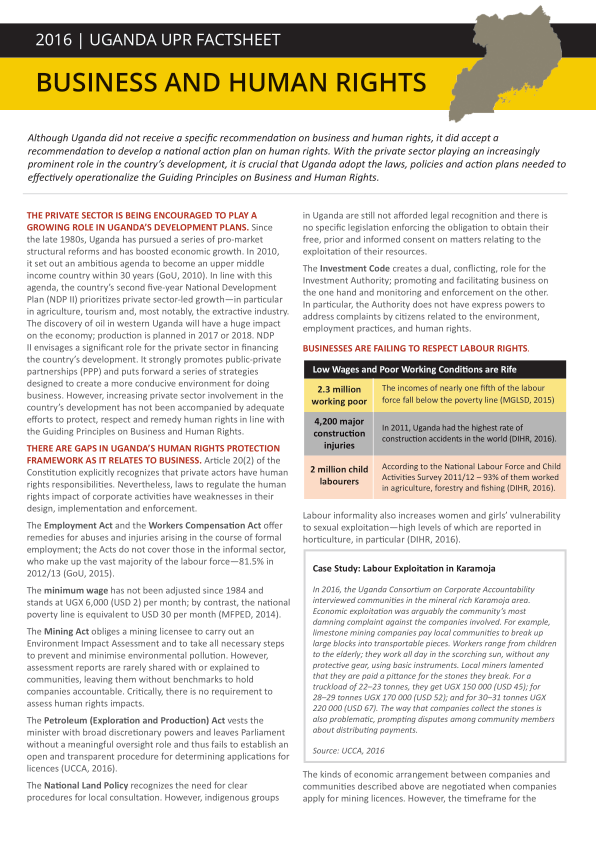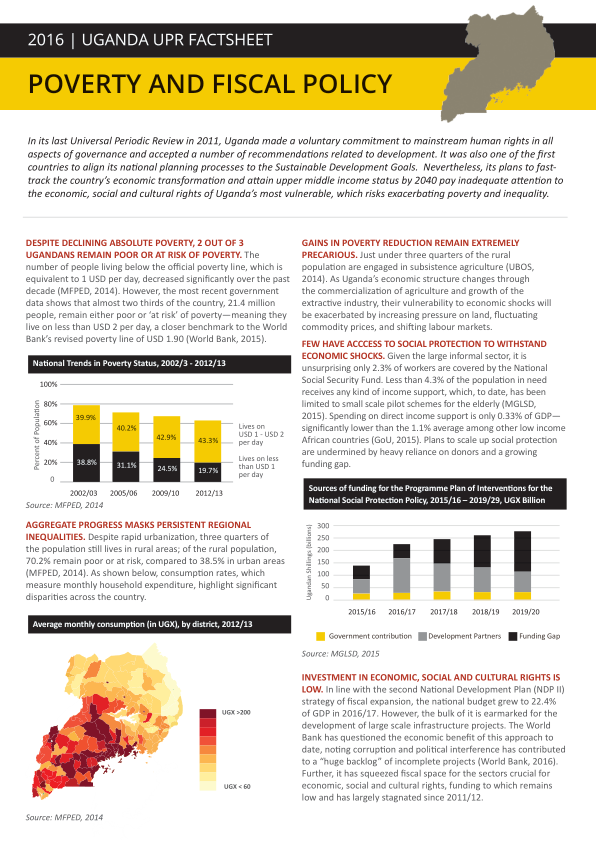PRESS RELEASE
Kampala/New York, 1 September 2016: Graphic evidence of chronic deprivations of economic and social rights in Uganda has been presented in Kampala today as members of the United Nations Human Rights Council prepare to review the country’s human rights situation later this year. In advance of Uganda’s appearance before the Human Rights Council’s Universal Periodic Review (UPR) mechanism in November, the Initiative for Social and Economic Rights (ISER) and the Center for Economic and Social Rights (CESR) have produced a series of short briefing papers highlighting critical human rights failures in the following areas:
1. The Right to Education
2. The Right to Health
3. Housing, Urbanization and Land Rights
4. The Right to Food
5. Business and Human Rights
6. Poverty and Fiscal Policy
Uganda is at a critical juncture in its socio-economic development. In recent years, the country has enjoyed a sustained period of stability and considerable economic growth. But despite progress in reducing the number of people living below the official poverty line, two out of three Ugandans remain poor or at risk of poverty, living on less than US $2 per day.
Food insecurity, preventable deaths and illness, poor housing conditions, and low educational attainment remain widespread. There are growing concerns about forced evictions and land grabbing and businesses failing to seek free, prior and informed consent before displacing indigenous communities from their ancestral land when natural resources are discovered.
The factsheets demonstrate that gains in poverty reduction have been precarious and that the government’s plan to fast-track the country’s economic transformation and attain upper middle income status by 2040 pays inadequate attention to the social and economic rights of Uganda’s most vulnerable. Investment in areas critical for these rights remains low and allocated funding is often not spent effectively. This gravely undermines the quality of public services that most Ugandans rely on. For example, although primary education is free, schools receive a staggeringly low $2.50 per pupil per year. As a result, many students lack textbooks, writing space and even classrooms; in such circumstances it is not surprising that only three out of ten of children complete primary school. This has resulted in the unregulated growth of private actors in public service delivery with many negative impacts on economic, social and cultural rights.
Meanwhile, the health budget for 2016/17 is 8.9%, which falls below the 15% Abuja Declaration target Uganda committed to, and this has detrimentally affected the quality of health services with many health facilities lacking essential medicines and necessary healthcare workers. Spending on agriculture as a percentage of the national budget is shrinking below the 10% Maputo Declaration target while housing received UGX 138 million (USD 41,000), a grossly inadequate figure considering that 85% of the low income population in the country’s capital, Kampala, lives in informal settlements.
While the country’s significance as an investment destination is growing, efforts to ensure that corporate actors are accountable for the impact they have on human rights have lagged. In the absence of a strong regulatory framework, this risks exacerbating poverty and inequality. For example communities face land grabbing and forced evictions. In the absence of a realistic minimum wage (currently less than US $2 - UGX 6,000 - per month), wages are low and the incomes of nearly one fifth of the labour force fall below the poverty line. Only 2.3% of workers are covered by the National Social Security Fund and less than 4.3% of the population in need receives any kind of income support, which, to date, has been limited to small scale pilot schemes for the elderly.
In an effort to boost private investment, the government is also actively promoting public-private partnerships in all sectors and creating a more conducive environment for doing business. In the mining sector, this includes offering generous tax exemptions and royalty arrangements, thereby losing a huge amount of revenue that could be invested in economic, social and cultural rights.
The six briefing papers were prepared by ISER and CESR to accompany the joint civil society submission on economic, social, and cultural rights in Uganda endorsed by 41 non-governmental organizations. “These findings raise serious questions about how fairly the benefits of economic growth are being distributed and the impacts this is having on human rights,” said Salima Namusobya, ISER’s Executive Director, noting “the factsheets underscore the government’s obligation to dedicate ‘maximum available resources’ to the realization of economic, social and cultural rights, summarizing key concerns and suggesting recommendations to improve the state of these rights in Uganda.”
Uganda will be called upon to answer these and other questions about its human rights record by other member states when it appears before the 26th Session of the UPR on November 3. “Although a peer-review mechanism between states, the UPR also provides a valuable opportunity for civil society organizations to present analysis shedding a critical light on the state’s own report on its human rights compliance” said CESR Executive Director Ignacio Saiz. The factsheets are part of broader efforts by CESR, in partnership with ISER and human rights groups across the globe, to strengthen the UPR’s effectiveness in holding states accountable for preventable deprivations of economic and social rights.
For further information, please contact:
- Allana Kembabazi, Initiative for Social and Economic Rights (ISER), info@iser-uganda.org, allanakembabazi@gmail.com +256772480260
- Allison Corkery, Center for Economic Social Rights, acorkery@cesr.org

The Initiative for Social and Economic Rights (ISER) is an independent, not-for-profit human rights organization responsible for promoting the effective understanding, monitoring, implementation, and realization of economic and social rights in Uganda.
